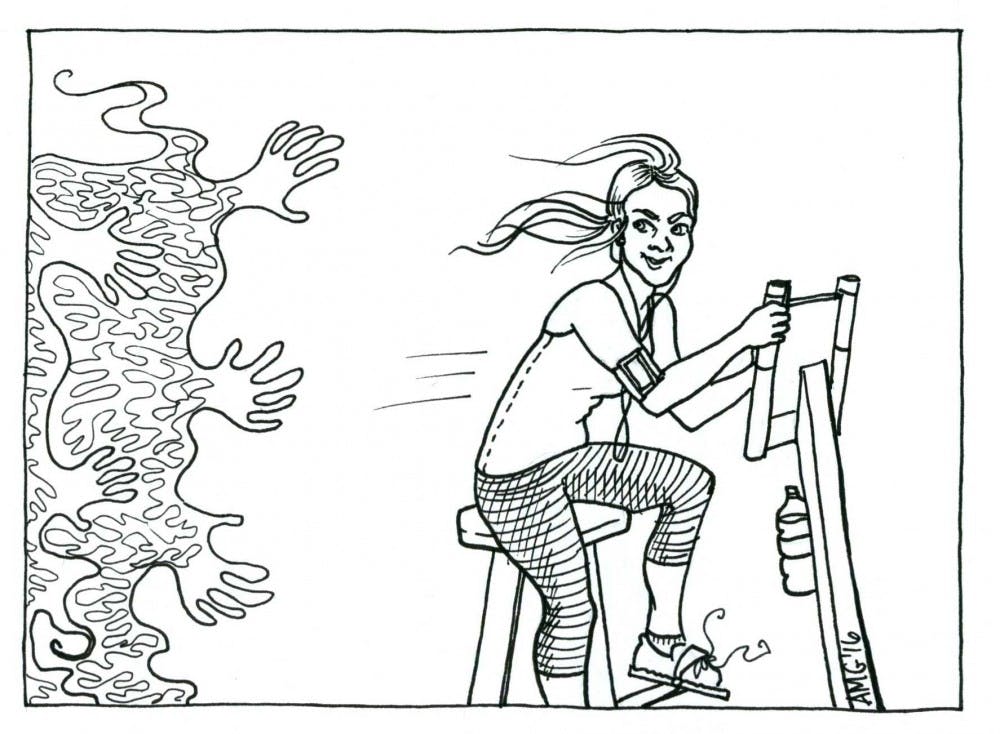At first glance, the sweat–slicked room where I take spin classes three times a week seems like a club. The music is loud and pulsing; the room is mostly dark except for glowing lights. But look more closely and there are rows of stationary bikes, along with an uplifting instructor whose main goal is to motivate you. This motivation differs from person to person, but it's completely different from the gentle affirmation you get from yoga instructors. Welcome to Flywheel.
I'm addicted to these classes. I first discovered Flywheel the summer after my sophomore year. I was living in a sorority house at George Washington University and working on Capitol Hill every day. I was also attempting to battle depression and an eating disorder.
Slowly over the course of my sophomore year at Penn, the seasonal depression that has affected me since my early teens led me down a path of self–destruction. I didn’t care about my health or my wellbeing anymore. When friends and family told me how thin I looked, I would attribute it to going gluten–free and adopting a healthier diet. What they didn’t know was that I threw up everything I ate. That I spent my weekends staying up until I saw sun. That I dragged myself to every party and every Sink or Swim.
I had my own room and bathroom that year, and I used the privacy to hide my problems. I was alone all the time, and I lost myself. I remember obsessively stepping on my scale and feeling satisfied when I saw the same number I had weighed when I was twelve. I pulled on the romper I was wearing out that night, which I had bought weeks before and was a tad too small. Soon, it was so big it fell off my body. That’s when I realized something was wrong.
When I moved to Washington, DC, I was living in a nine–by–nine foot cave, sharing a room for the first time since my ill–fated freshman year experience in the quad. Suddenly, the vomiting I had kept under wraps all year was shoved into the forefront of my public life. I felt extremely self–conscious about my disorder. I decided I would have to shape up, fast, before people found out about my problem. I was still terrified about gaining weight, though, so I decided I would have to start working out.
Let’s be clear: I can count the number of times I’ve been to a gym on one hand. I would always tell people I would rather not eat than work out, and they were jealous as hell of the self–control that I apparently had built up. I thought taking a class would be the best way to introduce myself to exercise. I chose Flywheel because I wanted a trendy, boutique fitness class I could Snapchat. I can see now how shallow I was. I needed to confirm the self–image I had carefully curated—that everything about me was stable and together, and that above all else, I was a Cool Girl.
It was these classes—the ones my friends tease me about for being “basic”—that helped me mitigate my depression and recover from my eating disorder.
By conquering my fear of working out and getting into the group mentality of Flywheel, I found myself again. I figured out that I would have to eat something or else I wouldn’t be able to keep stride with the person next to me. I was proud of myself for spinning before work and starting my day early. I passed on the late nights at Sign of the Whale (the Smokes’ of DC) in order to wake up to go to Flywheel at 6 a.m. I had never been able to let go of my thoughts until that summer. Flywheel gave me an hour of my day when I could actually let my mind go blank.
Two years later, I’m still hooked on Flywheel. I’ve managed to drag every single one of my friends, parents and my boyfriend to a class or two. I don’t feel the need to defend it to my eye–rolling friends when I show up somewhere late because I forgot to mention I was hitting the 9 a.m. class with Kate, or when I head into my geology lecture still covered in sweat. I don’t need to justify myself when someone makes the inevitable comment about how betchy spin classes are. Flywheel is my therapy. And hey, don't knock it until you try it.

